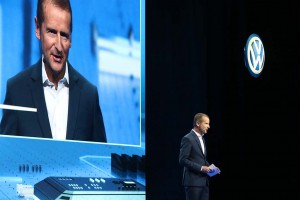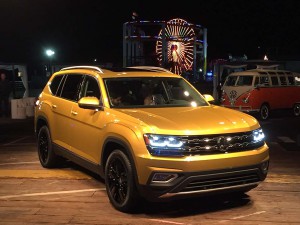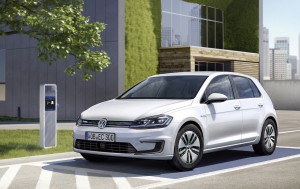
VW boss Herbert Diess unveiled Transform 2025, the maker's plans to regain trust and sales momentum in the U.S.
Regaining trust and momentum in the U.S. market will be critical, the head of the Volkswagen brand said Tuesday, Herbert Diess revealing an ambitious plan, dubbed Transform 2025, that he said would “fundamentally change Volkswagen” in the wake of its diesel emissions scandal.
The announcement comes just days after the VW brand announced it would cut 30,000 jobs, most in traditional manufacturing operations in Germany, while creating 9,000 new ones in areas such as the development of electric vehicles.
The Transform 2025 plan sees significant shifts, among other things, away from the diesels that have long been a Volkswagen mainstay to hybrids, plug-ins and pure battery-electric vehicles. There will also be a push to develop new in-vehicle software, and to take a lead in the emerging fields of ride- and car-sharing.
More broadly, the largest brand within the powerful Volkswagen Group says it will launch an array of new products, including large SUVs, sedans and electric vehicles. That includes the new three-row VW Atlas, Atlas now making its public debut at the Los Angeles International Auto Show. It was developed primarily for the U.S. market and will be assembled at the maker’s plant in Chattanooga, Tennessee.
Once one of Volkswagen’s largest markets, U.S. sales have ridden a roller coaster since the demise of the original Beetle 40 years ago. At the beginning of this decade, former Volkswagen AG CEO Martin Winterkorn outlined an aggressive strategy for the U.S. market, projecting combined sales for the VW, Audi, Lamborghini and Bentley brands would top 800,000 by 2018. But group sales reached just 472,486 for the first 10 months of this year, a 6.4% decline.
(VW cutting 30,000 jobs worldwide in wake of diesel scandal. Click Here for the story.)

The new VW Atlas on the Santa Monica Pier. The new ute is key to the automaker's revival in the U.S.
The hit was even harder when it comes to the flagship Volkswagen brand – which accounts for 59% of global unit sales for VWAG. For the first 10 months of the year, demand was off 13.1%, at 256,047 vehicles.
The ongoing diesel scandal hasn’t helped. After admitting it rigged two turbodiesel engines to illegally pass emissions tests, VW has so far committed to pay more than $20 billion in fines and other expenditures. The damage to its reputation has been equally costly, especially in the U.S. Complicating matters, it still cannot sell any of those diesel models in the States where they once accounted for a quarter of the company’s volume.
“For years we have been lacking a blueprint for success in the U.S.,” said Diess, who left rival BMW to join Volkswagen In July 2015. But the U.S. isn’t the only place VW has to rebuild momentum, he said, noting the company is “losing ground to rivals in markets like Brazil or India. In part we have also missed market trends, above all the SUV boom.”
(Click Here to check out the new Volkswagen Atlas SUV.)
Along with the 30,000 job cuts announced last week, VW will drop a number of unprofitable models, according to Diess, though he declined to say which ones they will be. That should save the maker about 2.5 billion euros, or $2.65 billion, it estimates.
VW will continue to invest around 4.5 billion euros, or $4.8 billion, annually in new products and services.
That money will help it expand its presence in one of today’s most critical product segments and prepare for growth in another. Today, VW markets just two SUVs worldwide, the Tiguan and Touareg. The Atlas will be the first step in expanding the line-up to 19 utility vehicles by 2020. Meanwhile, Diess has already revealed plans to have 30 battery-electric models by 2025, including a production version of the Golf-sized I.D. concept car unveiled at the Paris Motor Show earlier this year.
Beyond product, Diess said VW will “massively step up” its software development. That will focus on several different areas:
- Technology needed to improve the efficiency of conventional vehicles;
- Control systems needed for battery-based models like the I.D.;
- In-car infotainment, such as the new gesture controls that will be offered on the updated Golf line next year;
- Advanced Driver Assistance Systems, or ADAS, and Autonomous vehicles, VW hoping to have its first self-driving car on sale early in the coming decade;
Software systems will also help VW increase its presence in the growing global car and ride-sharing businesses. The maker has already been making numerous investments, among other things taking a stake in the Israeli-based Gett ride-sharing company.
Over the course of the next decade, the VW brand hopes to boost its operating profit margin from the current year forecast of 2% to about 6%. Whether that will be enough is questionable, however. Several key rivals, including Ford and the Renault-Nissan Alliance, are shooting to get closer to 10% in the coming years.
(For the latest on the VW diesel scandal, Click Here.)
Shares of parent Volkswagen AG rose in the wake of the Tuesday announcement — but the company’s stock is still down by about a quarter since the diesel emissions scandal erupted in September 2015.

